#superego
Explore tagged Tumblr posts
Text
Is anyone ever gonna top “attention freaks, it’s me. we’re supposed to be starting our new job at any moment. how do we get out of here away from you immediately? (…) how strange. they’re pretending they don’t respect me.” like, the words, the delivery, the cadence, the quality meme content, truly our generation’s to be or not to be
124 notes
·
View notes
Text
Astrology Houses: what is "me"?
1st House: instinctive manifestation of "me"
2nd House: inward construction of "me"
3rd House: construction of "me" through gathered information
4th House: acknowledgement of "me"
5th House: establishment of "me"
6th House: detachment from "me"
7th House: I am "me" through understanding others
8th House: I am "me" through understanding myself
9th House: I am "me" through understanding what lies beyond myself and others
10th House: there is "me" in society
11th House: there is "me" in humanity
12th House: there is "me", but it's temporary.
#astrology#birth chart#astrology houses#1st house#2nd house#3rd house#4th house#5th house#6th house#7th house#8th house#9th house#10th house#11th house#12th house#ego#superego#spirituality#esoterism#human psyche#construction of self#oneself#observations#mine#my theory#my observation#astrology theory#astro community
39 notes
·
View notes
Text
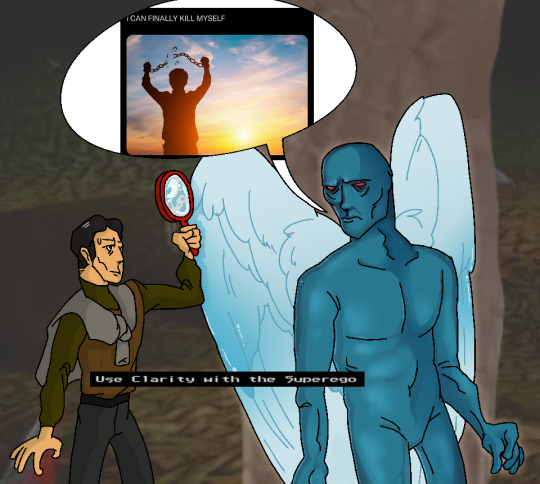
this is how the game went right
#ihnmaims#i have no mouth and i must scream#ihnmaims video game#superego#AM#ted#ted ihnmaims#AM ihnmaims#superego ihnmaims#art#my art#sorry i made him look like That
275 notes
·
View notes
Text
i have MANY pieces of art to post
first and foremost, FUNGER 💥💥💥💥💥
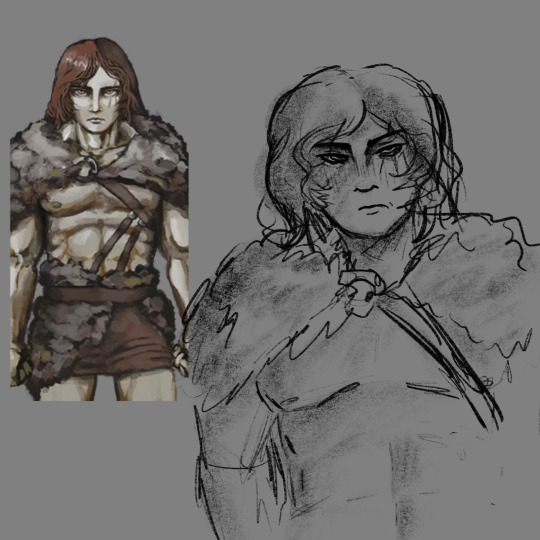

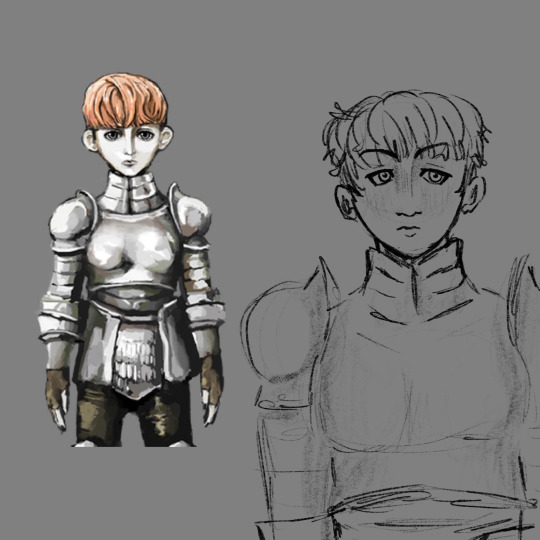
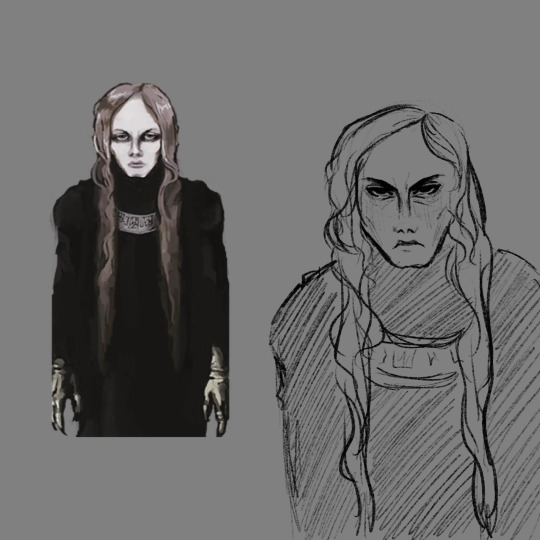
then THE TRIPARTITE PERSONALITIES 🔥🔥🔥🔥






#fear and hunger#fear and hunger darce#fear and hunger cahara#fear and hunger ragnvaldr#fear and hunger enki#id#ego#superego#freud#VampyricArt
35 notes
·
View notes
Text
Kaneshiro's all time favorite personality theory must be Psychoanalytic Theory of Sigmund Freud because that talk about "Ego" encapsulated almost all of the arcs in Blue Lock. It might be more interesting if he included the "Id" and "Superego" because if they have a player who represented these two it will be Shidou and Yukimiya in the different sides of the spectrum.
Also, I just got a look again at Kiyora and his backstory and this screams Alfred birth order theory because of its emphasis on how personality and behavior can affect a person's birth order in the family. And Kiyora displayed the classic middle child syndrome in that one.
#not me staring at the ceiling and decided to write this nonsense#blue lock#bllk#theories of personality#psychoanalytic theory#birth order theory#sigmund freud#alfred adler#ego#id#superego#shidou ryusei#yukimiya kenyu#kiyora jin
25 notes
·
View notes
Text
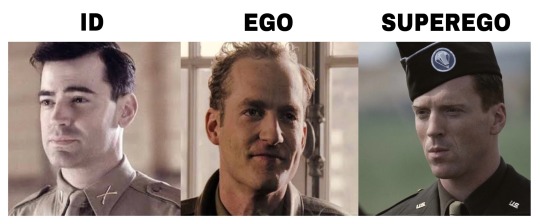
#lewis nixon#harry welsh#richard winters#richard dick winters#dick winters#band of brothers#bofb#bob#hbo war#sigmund freud#freud#id#ego#superego#hbowar edit#hbowar shit post
54 notes
·
View notes
Text

quick post today, i’ve been working on some character designs for personifications of the id, ego, and superego! superego here was heavily inspired by @verumc0dex ‘s mad god au! i love their brick house hektas lmao
9 notes
·
View notes
Text

Her Superego
#cats of tumblr#i love cats#cute cats#hello kitty#kitty cats#kitties#cuteness#adorbs#meow#adorable#superego#cat blogging#watching tv#cats watching tv#caturday#cat lovers
7 notes
·
View notes
Text
Oropo; the ideology of power behind being god: Part 3
Doing an analysis on Oropo proved to be a messy, disorganised process, not all that different from the actual character's actions themselves.
Every time I have tried doing this, I ended up saying nothing worthwhile and mostly just rumbled for a bit without reaching any meaningful conclusion; but I feel like I've finally found something that's actually important and can help the discussions surrounding the character.
Buckle up cause it's time for me to introduce to you all a little something also known as:
The complex of Oedipus

Conceived in 1909 by the Austrian psychoanalyst Sigmund Freud (1856-1939), the Complex of Oedipus is a section of the written paper "Analysis of a Phobia in a Five-Year-Old Boy" in which Freud outlined the fear of horses of a boy known as "Little Hans".
The psychoanalyst determined that the boy's terror was due to feelings of anger he had internalised. According to Freud, all small boys choose their mother as their primary object of desire. They subconsciously wish to usurp their father and become their mother's lover. These desires appear between the ages of 3 and 5, when a boy is in what Freud defines as the "phallic" stage of development.
This stage represents an important point in the formation of sexual identity. The analogous experience for girls is known as the Electra complex, in which girls feel a desire for their father and jealousy of their mother. The child, however, suspects that acting on these feelings would lead to danger, thus he/she represses his/her desires. This leads to anxiety.
In order to resolve the conflict, the boy then identifies with his father and the girl with her mother. It is at this point that a superego is formed; it becomes an internalisation of the parental figure that strives to suppress the ID's impulses and make the ego act upon these idealistic standards.
The ID, ego and superego are, as described by Freud, the three main parts of the human mind that develop our personality through their interactions.
The ID is the most primitive. Within the ID are all the inherited components of personality we are born with, including the sex instinct, the Eros and the instinct towards aggression. The ID operates entirely unconsciously; it does not change with time or experience, since it is not related to the external world.
The ego is the rational, pragmatic part of our personality. It's less primitive than the ID and is both conscious and unconscious; it represents what may be called reason and common sense. Freud used the word "ego" to mean a set of psychic functions such as judgment, tolerance, reality testing, control, planning, defense, synthesis of information, intellectual functioning and memory.
The superego is concerned with social rules and morals, and covers what many would refer to as "conscience". It develops around the age of 3-5 and it consists of two systems: the conscience and the ideal self. The conscience is a part that can punish the ego by making it feel guilty. The ideal self, on the other hand, creates an imaginary picture of how you ought to be, and deals with ambition and social behaviour, including how you treat others and how to be a useful member of society.
According to Freud, the ID, ego and superego, are in constant conflict so that adult personality and behaviour are directly from the results of these internal childhood struggles.
The parallels
So, now that we have established what the Complex of Oedipus is, it is time to see how it connects back to our deranged owl man and to the entire race of the Eliotropes.
At this point though, I have to make a brutal yet sad confession: I have not watched the fourth season of Wakfu nor the Oropo special with all of the new Eliotropes, so all I'm going to focus entirely on Oropo for this analysis and hope that somebody else who has watched season 4 can piece together what aspects of Freud research are present in which Eliotrope and how it all ties back to Yugo.
For now, we can see how the first four paragraphs of the document have unsettling similarities to the entire concept and actions of Oropo and the Eliotropes.
Now, we need to consider that Freud at the time probably didn't take bisexuality and other gender identities as things an individual was born with; because in the case of the Electra complex we need to remember that all female Eliotropes are canonically lesbians, as reiterated by @cocogum in this post , thus, the more modern (or at least the most Wakfu relevant) interpretation of the two complexes that we should consider is: "the child wish to usurp the parent whose at the recieving end of the kid's sexual attraction, and to overcome said urge, identifies with that parent". I could make a different case for bisexuality, but it's not relevant.
The important thing about these two complexes is explaining why Oropo feels so much attraction for Amalia to not be able to contain himself even with Lady Echo. The entire concept behind the Eliotropes is that they were incomplete parts of Yugo that came into existence by accident and couldn't survive nor have an identity of their own without Yugo.
For how much Oropo plays himself up as this secretive master planner, he's actually a mere sexually repressed clone-child that's unable to grow up due to the very nature of his existence.
Finally appreciating canon Oropo: the trilogy's finale.
I feel like, once I learned about the connection between Sigmund Freud and Oropo, I finally started to care a little bit about the guy and the entirety of the Eliotrope's race. Granted, this analysis does fix the many problems and qualms I have with the character; like, if his writing problems limited themselves to the season 3 finale then I could pass it off as just the sad, miserable conclusion of a doomed existence, but no. Unfortunately, Oropo has problems even in the manga and ova created solely to expand on his character, it's like Tot is completely unable to give his writing pet the necessary traits to make him an antagonist worthy of the Wakfu's standards, and instead just uses him for cool visuals and to fill in the untold parts of the lore.
He came up with a truly brilliant concept reminiscing the psychoanalysis of the 19th century, and couldn't find a way to explore said concept in a meaningful way because he had to turn it into a fight. Naturally, this isn't just a Wakfu problem, this is an anime and media problem at large, where we necessarily have to resolve conflicts into a battle because otherwise the audience could feel bored and disinterested in the final product.
This is a problem that carries over to the Avatar franchise, where the creators tried to have meaningful political commentary and couldn't find a meaningful way to have it that didn't involve a fight, because, if they don't turn it into a fight of good and evil, then the audience could feel scared at the prospect of such a challenging, morally compromising story.
To me, Oropo would have been a far more interesting character if he just wanted to overthrow the gods for their selfishness and wanted Yugo to approve his decisions because he was his creator and he loved him.
Could have made for a far more interesting story than just simply going back to the status quo and compromising it only through the inclusion of the Necromes, who pretty much just sought destruction and didn't really change the hierarchy in a meaningful manner.
<<<<Previous part
Nox analysis
Qilby analysis
#wakfu oropo#wakfu eliotrope#wakfu ova#wakfu yugo#wakfu amalia#wakfu echo#necromes#tot#ankama#krosmoz#sigmund freud#psychoanalysis#character analysis#oedipus#electra complex#wakfu nox#wakfu qilby#wakfu season 3#avatar the last airbender#avatar the legend of korra#status quo#wakfu manga#writing#analysis of a phobia in a five year old boy#sexuality#political commentary#superego#ego#id#essay
27 notes
·
View notes
Text
attention freaks. it’s me. we’re supposed to be starting our new job any moment. how do we get out of here away from you immediately
83 notes
·
View notes
Text
Superego vs Trickster Mode (Engage)


Superego From coloUrs and mayhem: Universe A By Jan Rodriguez Propaganda: "Hell Fucking Yes… god i love nucleose. Top Homestuck composers constant peak. This is like one of my favorite HS songs." "the best song ever. just listen to it. it sounds like vriska. its the platonic sonic ideal of vrisky essence. never has there ever been a more accurate musical representation of a character. also its just good without the context of vriska. its a fire song and it makes you feel badass. SUPEREGO MASSIVE VICTORY 2025"
Trickster Mode (Engage) Unreleased By Toby Fox Propaganda: None submitted
youtube
#homestuck music tournament#homestuck#homestuck music#Superego#Trickster Mode (Engage)#Round 1#Bandcamp#Youtube
12 notes
·
View notes
Text
Emily Prentiss, Director Madison and F*cking Brian
Left to right: Paul F. Tompkins, Paget Brewster & Clark Gregg on The Thrilling Adventure Hour Live (2013)

FBI Declassified Files #2
#paul f. tompkins#Paul f tompkins#Thrilling adventure hour#TAH#Paget brewster#clark gregg#marvel agents of shield#agents of shield#Aos#phil coulson#criminal minds evolution#Criminal minds#CM#Emily prentiss#bojack horseman#Podcast#Comedy bang bang#Cbb#Superego
27 notes
·
View notes
Text
there are three wolves instead of me. Two are constantly making outrageous demands, one for selfish reasons and the other for moral ones. The third wolf desperately tries to reason with the two of them, resulting in me making (mostly) normal decisions
#id#ego#superego#id ego superego#freuds personality theory#freud#psychology#there are two wolves inside me#pleasure principle#reality principle#morality principle#freudposting#i have an exam tomorrow#i should brush my teeth then go to bed#evil in every soul
14 notes
·
View notes
Text
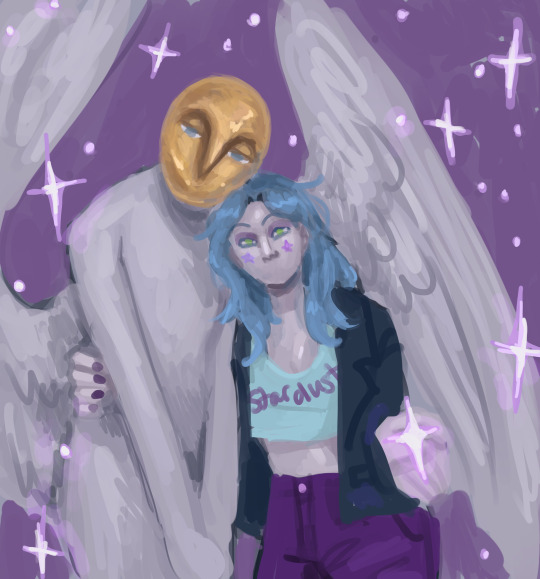
I'm going to do art fight :)
#I'm excited! I'm a little worried that I won't have as much energy once july actually comes around. Hopefully it'll be fine#especially if people actually. like. draw my little guys. That'll probably be pretty motivating :D#anyway.#ocs#id#superego#my art
15 notes
·
View notes
Text
The wrathful glare of Kali and the callous gaze of Medusa – the emergence of the femme fatale in the female psyche.
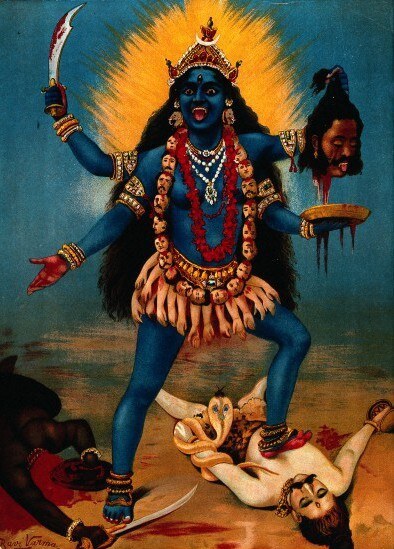
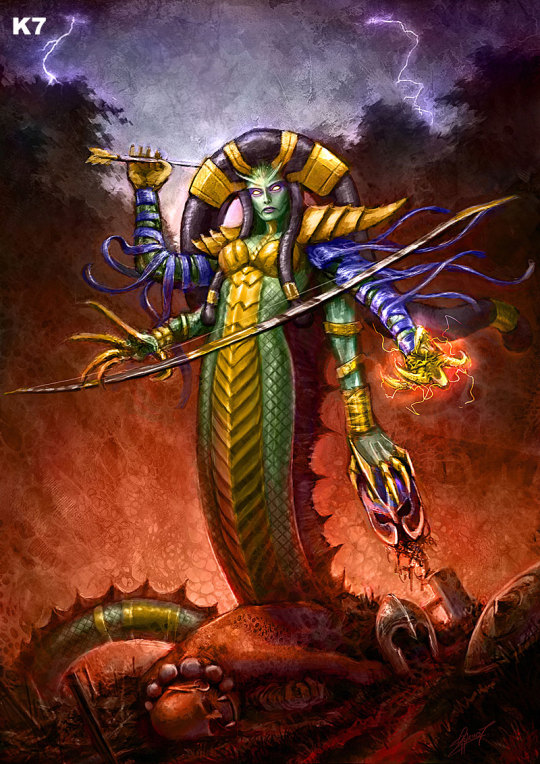
Legend of Kali
In Hindu legend, goddess Durka and her helpers, the Matri goddesses, slay the demon Raktabīja, only to find out that the stains of Raktabīja’s blood act like seed on soil as every drop manifests another duplicate of him. Durka becomes enraged and summons Kali, whom then proceeds to slay and devour Raktabīja and his legion of duplicates. She dances on their corpses and parades around with Raktabīja slain head in her hand, securing the droplets of blood through holding a plate underneath it, so as to prevent further bleeding on the soil. Motivated by her insatiable fury, Kali proceeds with the destruction of all else that crosses her path, but after stepping on the corpse of Lord Shiva, Kali is struck by embarrassment and remorse as her supressed superego is released from her shadow and brings her back to her senses. Lord Shiva’s has the power to liberate Kali from her fury as he is the transcendent Self. He is the benevolent patriarch, yogi supreme, yet also husband and father, suggesting the achievement of harmonious balance between wordily duties and that of holy men. His anima, being integrated, is neither possessing him nor is it plaguing him as a result of repression. He neither falls prey to the manipulative trickery of deceitful women nor does he view women as disdainfully inferior sexual objects. Only he can liberate Kali from her all-consuming misandry and soothe her sorrows.
Shiva’s non-threatening benevolence makes itself known through the act of laying underneath Kali’s feet. Possessed by wrath, Kali has lost sight of that which is holy. Without recognition of the benevolent aspects of Shiva, Kali’s fury is bound to drown the universe in her flames, however, Durka’s initial intention behind the summoning of Kali was to defeat Raktabīja and his legion of duplicates, rather than bring about the destruction of the universe.
Durka and the Matri goddesses are at loss at Raktabīja’s lack of chivalry in combat and the injustice of his supernatural power. They are the modern-day women whom get harassed by demonic and demeaning men despite enforcing their boundaries. Such men seek to dominate through ridicule rather than reason. The lack of decorum in both combat and dialogue makes the summoning of Kali inevitable for a woman as all else has failed to shield her vulnerability from the malevolence of a demonic beast.
In recent memory, Raktabīja and Poseidon manifested themselves as Harvey Weistein and Jeffrey Epstein, powerful demonic beasts, seeking to preserve their authority whilst uninterested in the discontinuation of their predatory behaviour. The faith in the punitive power of the rule of law arrests Kali from flooding the consciousness of their victims, making Durka and the Matri goddesses persevere in a civilized manner, unlike the instance in which 200 Indian women, armed with vegetable knifes, stones and chilli powder stormed the court hearing of gang-leader and rapist Akku Yadav, dismembering his genitals with a vegetable knife, robbing him of his phallus through a vengeful barbaric act of literal castration, dead in a matter of 15 minutes, leaving his lifeless corpse daggered by kitchen knives on the white marble floor of the court, in an exhibition of gore galore, resembling the sublime beauty of a transcendent piece of art in the eyes of Kali.
Legend of Medusa (Ovid´s version)
In Greek legend, Medusa is the sole mortal among three gorgon sisters, depicted as a beautiful maid with plentiful of potential suitors, longing for the reciprocation of her attention. She is brutally raped in the temple of Athena by God Poseidon as a result of the rejection of his advances. Enraged by the desacralization of her temple, Athena curses Medusa, turning her hair turned into snakes, metamorphosing her into a monstrous form armed with a glare that petrified anyone who dared to meet her eyes.
As if Medusa hadn’t suffered enough, she was later beheaded by demigod Perseus. Many men had tried to behead her prior to Perseus, but all had been turned into stone at the sight of her petrifying glare. Perseus however, was clever enough to stare into the mirror moments before the beheading, instead of in her eyes. As he flew over Libya with Medusa’s decapitated in his hands, blood dripped on the soil and snakes sprout from the droplets. Medusa’s head is later gifted to Athena, whom attaches it to her shield, supplying her with the power of Medusa’s deadly glare in combat.
The legend of Medusa is one of horrific injustice and betrayal. After the violation of her person through the act of rape, her boss, Athena, does the unimaginable: curse her. The ancient equivalent to the modern-day slut shame of a genuine victim of rape. The horrors of rape alone didn’t metamorphize her hair into serpents, it was that the aftermath of her rape was followed by the ultimate betrayal by a deity she had bestowed with trust.
If Kali’s fury has lit her heart on fire, then Athena’s betrayal has frozen Medusa’s heart into ice. In Kali, the Nietzschean will to power is alive and striving, but in Medusa it is nowhere to be found. Medusa, as a beautiful maiden was pure, pure in the sense that she couldn’t conceive of the unfathomable betrayal of Athena, thus when it dawned upon her hope in both humanity and divinity was lost. Anyone who’s superego isn’t as disturbed as that of Athena and Poseidon will be overwhelmed by their conscience upon meeting Medusa’s gaze. The burden of her victimization is a collective bearing for all to carry, reminding us of the consequences of vicious cruelty.
Every young boy has looked into the eyes of Medusa as their, otherwise loving, mother coolly hit them with the “I’m not mad, I’m disappointed,” remark. Such disappointment, from women, causes a man to cringe in an instinctive act of clenching the gut muscles.
In yogic philosophy, masculine consciousness is associated with fire and believed to reside in the solar plexus. One believes to be speaking figuratively when alluding to bravery as “having guts” but embodied bravery, is quite literally impossible without having a strong presence in the gut area.
The act of cringing is the act of shame as a biological reaction rather than an emotion. Medusa’s ice-cold gaze, cursing one to cringe in shame, is the true extinguisher of a man’s masculine consciousness, making him think twice before he acts next time, however since Medusa has lost hope in the redeeming qualities of man, there will be no next time, whomever meeting her gaze is doomed to freeze for all eternity. The many men whom attempted to behead her prior to Perseus couldn’t bear the collective burden of a restless conscience and thus instinctively attempt to rescue their phallus from the prospect of psychic castration through beheading the source of their restlessness. Such an act of profanity, is nothing short from foolish desperation, a last resort for restoring balance in one’s psyche, bound to fail from the get go, which is why all men prior to Perseus freeze to stone upon their attempted murder.
Perseus only finds success through looking in the mirror at the moment of execution, sparing his phallus from castration as his conscience remains unaffected, but his heinous crime is not without consequence as Medusa’s spilled blood sprout to life venomous serpents on Libyan soil. Medusa is Mahsa Amini, as the Iranian morality police seem to mistake the beauty of a woman’s hair for poisonous serpents. The serpents sprung to life by Medusa’s blood are the many Iranian women unleashing the terror of their liberated hair upon the morality police. Nothing terrifies fundamentalist Islamists more than the emergence of their own anima, as it becomes projected upon an enchanting woman.
Raktabīja’s blood stains produce duplicates as a reaction to fair female resistance, Medusa’s blood stains produce serpents as a reaction to horrific injustice and a cowardice murder. The moral of the story is that injustice and disrespect of self-assertion lay the groundworks in which mayhem may flourish.
Lastly, Athena attaching Medusa’s head to her shield is a ploy to harness the power of a victim’s hopeless disappointment and masquerade it as her own. Athena, despite being a deity, could impossibly freeze her opponents with her own gaze, as she created Medusa’s through initiating the destruction of her reputation. It is solely through a masquerade in which Athena cosplays victimhood that she can harness the powers of it.
#kali#medusa#greek mythology#ancient greek#greek texts#greek posts#hinduism#hindu mythology#psychoanalysis#sigmund freud#freud#carl jung#analytical psychology#feminism#rapeculture#superego#literary criticism
35 notes
·
View notes
